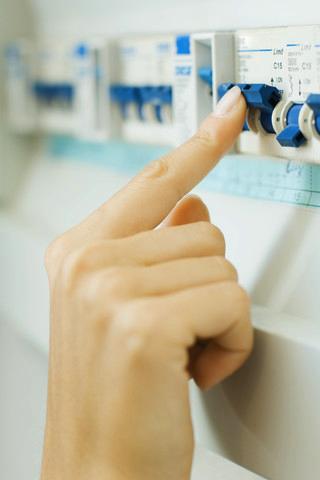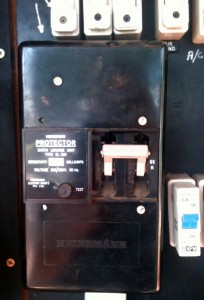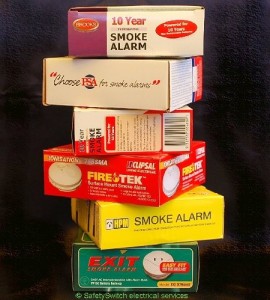RCD FAQ ~ Questions on RCDs and smoke alarms
RCD FAQ ~ about RCD’s and Smoke Alarms.
The Perth RCD Safety Switch & Smoke Alarm installation specialists
Phone: 0404 216 333 or email us
RCD Safety Switches & Smoke Alarms are a mandatory requirement by LAW.
For further information on your responsibilities call 0404 216 333
FAQ about RCD safety switches.
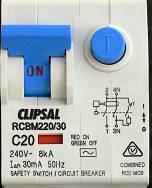
Typical RCD. TEST button at top right. Switch is in ON position, (UP).
Q: What is an RCD? An RCD (residual current device) is an electrical safety device that cuts off electricity when it detects electrical faults to earth. It is commonly referred to as a safety switch and it is now mandatory to have these installed to protect all circuits on new domestic installations to help prevent electric shock.
Q: How does an RCD work? The RCD safety switch will assist in preventing electric shock by constantly monitoring your circuit. When it detects an electrical fault from the active or neutral conductor to earth, your power is switched off in an instant. With no RCD fitted, that hazard remains unchecked increasing the risk of a fatal electric shock.
Q: By having an RCD fitted it means I can’t get an electric shock? No. A fatal electric shock still can occur between active and neutral conductors, other unprotected circuits, a faulty RCD, or one incorrectly fitted. Which is why it is important to have your RCD tested regularly.
Q: How fast should a safety switch turn off the power? Typically around 10 to 30 milliseconds (ms) although some older RCDs may be much slower which is why it is always a good idea to test your RCD every 1 or 2 months. We usually note that old RCDs trip within 80 to 100 ms but too often some fail to trip altogether.
Q: How much does it cost to install an RCD safety switch in Perth? Prices start from as little as $150 each (supplied and fitted) for multiple residential RCD installations. Costs do depend on the type of electrical box installed at the premises as the RCD must fit correctly and be compliant. We have seen cheaper RCDs of poor quality on the market from questionable sources but reputable electricians refuse to install them. We have also seen RCD’s fitted to old fuses. This IS NOT the way to install RCD’s. Often old panels (especially asbestos) need to be replaced outright.
Q: What is the best RCD RCBO Safety Switch for my home? We have found the 6KA NHP MOD6 and ABB RCBO / RCD Safety Switches are the pick of the bunch on the domestic market for both quality and practicality.
Q: How many RCD switches do I need on my house? That depends on the number of circuits / fuses there are on your switchboard / fuse box. As no more than 3 circuits / fuses are permitted per RCD it may be necessary to install multiple RCD switches to larger fuse boxes. In any instance a minimum of 2 RCDs are required.
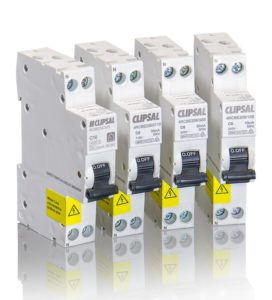
RCBO safety switches
Q: What is an RCBO or RCDMCB? These are the latest safety switches that have the dual function of working as an RCD but also protect the circuit from overload as a fuse or circuit breaker will. This saves valuable space on electrical panels by taking away the need to fit separate circuit breakers or fuses. SafetySwitch electrical services always install RCBO’s providing a much better electrical installation overall. If you are having new RCD’s fitted ask your electrician to install RCBO’s.
Q: Can I have all my fuses / circuits protected by RCD Safety Switches? YES! It is now legislated that all new installations have RCD’s protecting all circuits. If your switchboard is upgraded it will need to have RCD’s put across all circuits including hot water, air conditioners etc.
Q: Can my RCD help prevent electrical fires. YES!
Q: Who can install an RCD to my home? Only a licensed electrician can install an RCD to your home and they must also provide you with an electrical safety certificate. As electricians we specialise in RCD installations. SafetySwitch electrical services has the equipment and expertise to do the job more efficiently and in a cost effective manner exceeding standard electrical regulations. Who would you rather trust? Read the reviews on Google.
Found our AD-FREE page useful? Leave a Google Review Fremantle Electrician is on Facebook
Fremantle Electrician is on Facebook ![]()
Smoke Alarms FAQ ~ Smoke Detectors FAQ
SafetySwitch recommends CLIPSAL FIRETEK smoke alarms
Q: What smoke alarm is legal and meets the latest building codes? As of the 1st of May 2017, only a smoke alarm labelled AS3786:2014 is legal for old and new homes. If only labelled AS3786, it is not legal!
Q: How many smoke alarms do I need for my house? It depends on the layout of the home. Small dwellings might only need 1 smoke detector but for the average home 2 hard wired smoke alarms are often required and multilevel apartments need smoke alarms on each level.
Q: I have battery smoke alarms in my home and I’ve just replaced the batteries, is that enough? NO. These types of smoke alarms whilst readily available, do not meet the requirements of new legislation which makes hard wired smoke alarms mandatory.
Q: I live in an apartment with concrete ceilings. There is no way to wire up a smoke alarm. How can smoke alarms be installed there? As specialist smoke alarm electricians we carry all the right equipment needed so that even concrete ceilings are not a problem.
FESA advise that when installing mains powered smoke alarms, always use a licensed electrician. It is recommended that smoke alarms be located in all sleeping areas and in all paths of travel between sleeping areas and exits to the open air. This includes sleeping areas in separate parts of the house and where sleep-outs or similar areas are not connected by a passageway to the main part of the dwelling. Wherever possible, smoke alarms should not be installed near kitchens, laundries and bathrooms.
Always use a licensed electrician. Contact your RCD and smoke alarm specialist on 0404 216 333
“A safety switch is a general name for a Residual Current Device (RCD). It is an electrical device specially designed to immediately switch the electricity off when electricity ‘leaks’ to earth at a harmful level therefore reducing the risk of electrocution. RCD’s operate on the principle of what goes in must come out.The RCD will continuously monitor the current flow through the active (supply) and neutral (return) conductors and should a fault occur where the electrical current leaks out, ie. travels to ‘earth’ at a value of 30 milliamps or greater then that imbalance is detected and will cause the RCD to trip immediately. A standard domestic RCD will cut off electricity within 10 to 50 milliseconds when a fault of 30 milliamps (0.03 amperes) or greater is detected. RCD’s are extremely important where there is water around, (bathrooms, any outdoor power, spas and swimming pools etc). They also have another important advantage – the RCD can reduce the risk of electrical fire by detecting an electrical fault to earth and this is significant for older installations”. © SafetySwitch electrical services 2001

